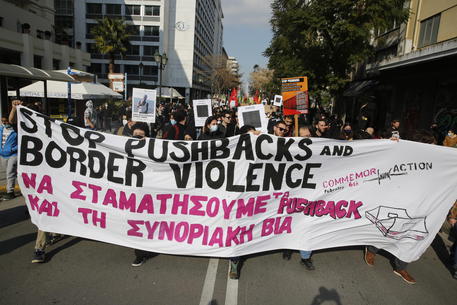(ANSAmed) - ATHENS, 18 FEB - Greece has once again moved
quickly to reject claims that the government has been involved
in alleged so-called "pushbacks", of migrants in the Aegean Sea.
According to reports in The Guardian and Der Spiegel the
deaths of two African migrants, from Cameroon and Ivory Coast,
last September was a result of pushbacks taking place.The
reports claimed that the two migrants arrived in the eastern
Aegean island of Samos last September from Kusadasi in Turkey
but instead of being given the chance to apply for asylum, they
were arrested by people who said they were police.
They were then allegedly transported, along with another
person, out to the open sea by a speedboat and thrown into the
water. While one of the men managed to swim to the Turkish
shores, the other two men were found dead, drowned, off the
coast of Aydin province.
But Greece's Minister of Migration and Asylum released a
strongly-worded media statement in response to the claims.
"Turkish-driven propaganda about illegal migration means that
false stories frequently appear in the media. Greece protects
the external borders of the European Union, in full compliance
with international law and in full respect of the charter of
fundamental rights," said Mitarakis.
He added: "Obviously national independent authorities
investigate all claims to the contrary, but when these
authorities request further information and evidence from the
authors of such reports they refuse to provide it. In the
absence of action by the Turkish authorities, the Hellenic
Coastguard continues to save the lives of thousands of men,
women and children at sea every year. Between 2015 and 2021 the
Hellenic Coastguard came to the rescue of more than 230,000
third country nationals who were in danger at sea. Greece is not
against legal migration; we are against the traffickers and all
those who exploit human suffering either for profit or for
political purposes."
The media statement also said that in the last seven years
alone, "Greece has provided safe harbour for over one million
people''. Putting that into context, that figure is over 10% of
the country's entire population.
This is hardly the first time that Greece has been prompted
to react to claims in the media about pushbacks. It continues to
be an extremely thorny issue, especially for Greek-Turkish
relations.
Only last week, the two countries were embroiled in a war of
words over the deaths of 12 migrants at the northern land border
near Ipsala.
Greece's government vehemently denied the claims made by
Turkey that the deaths at the border area between the two
countries was a result of alleged illegal pushbacks made by
Greek border guards.
Then Mitarakis had dismissed the accusations made by Turkish
Interior Minister Suleyman Soylu, who via a post on Twitter said
the 12 people who died froze to death, and that they were part
of a larger group of 22 people who were stripped of their shoes
and clothing by Greek border security. While he did not specify
the nationality of the migrants, Soylu shared blurred out
photographs of eight of the recovered bodies, including three
men who were in shorts and T-shirts.
"The death of 12 migrants on the Turkish border near Ipsala
is a tragedy. But the truth behind this incident bears no
resemblance to the false propaganda pushed out by my counterpart
Minister, Mr. Soylu," Mitarakis said last week.
He added: "These migrants never made it to the border. Any
suggestion they did, or indeed were pushed back into Turkey is
utter nonsense. Rather than pushing out unfounded claims Turkey
needs to live up to its obligations and work to prevent these
dangerous journeys at source. And, instead of blaming others,
Turkey must accept their responsibilities if we are to prevent
such tragedies from happening again."
In the past year, the Turkish government has repeatedly accused
Greece of pushing back asylum seekers, which would be in clear
violation of international law and human rights.
Several NGOs have also made statements claiming that Greece,
with help from the EU, is trying to keep migrants away from
entering Greek waters, and even of returning migrants to Turkish
waters. However, there have also been counterclaims, saying
Turkey moves migrants it intercepts in its own waters to Greek
waters.
The EU has also voiced concern over allegations of such
pushbacks at sea, but in a series of investigations, Brussels
has exonerated its Frontex agency from any complicity in the
alleged pushbacks.
Both the Greek and the Turkish government have repeatedly denied
conducting such pushback tactics. (ANSAmed).
Greece point finger to Turkish propaganda on pushbacks
Migration Ministry refute international media reports
 FOTO
FOTO